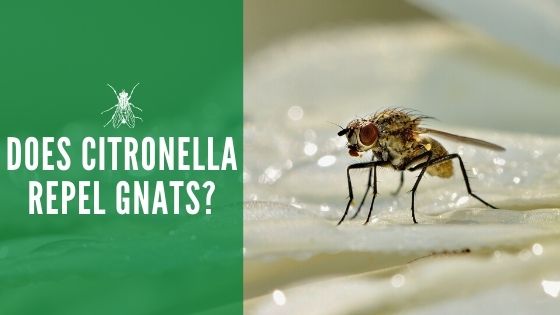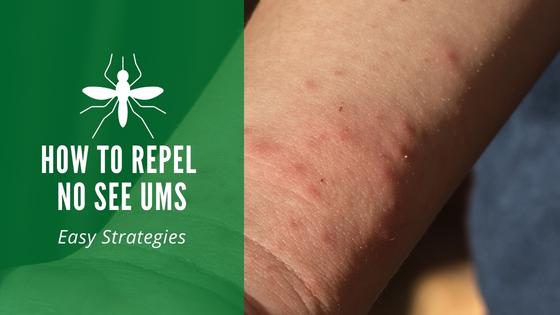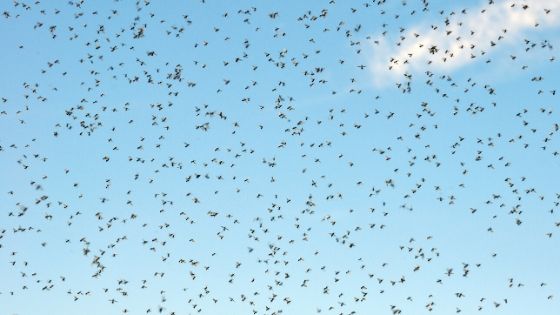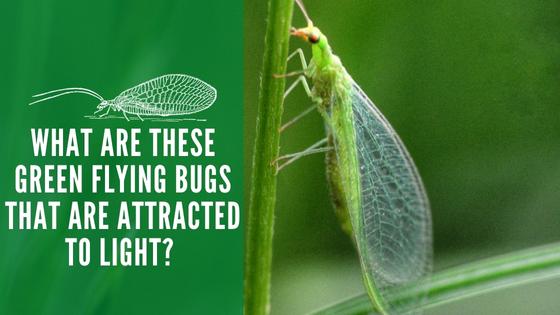Does Citronella Repel Gnats?

There’s nothing more annoying than a typical gnat. They buzz, they annoy, and they tend to come in very large clouds that seem like something out of a cartoon. Gnats are more of a pest than a danger for you or your yard. They don’t damage plants; most species don’t bite; otherwise, they don’t cause too many problems.
However, in very large numbers, they can start to cause some problems. If you want to start repelling gnats without using chemicals or pesticides, here are a few types of plants that will do the trick.
The Problem With Gnats
The main problem with gnats is that they don’t make a home near your yard. They can swarm into the area from just about anywhere, and if you don’t have access to their home, you can’t stop them at the source. You can work to make your yard a place where the bugs won’t want to hang out.
First, you can do your best to remove mold, fungus, standing water, and rotting plants from the yard. Cover up your compost and trash cans, rake wet mulch to allow it to dry out, and don’t overwater your garden or soil.
If you can remove as much water from your yard as you can, then the gnats won’t have anywhere to congregate. Fungus and molds are the primary food source for certain types of flies, like fungus gnats and fruit flies.
Does Citronella Oil Repel Gnats?
Yes, citronella is a bug repellent plant for gnats, bees, wasps, roaches, ants, moths, flies, ticks, fleas and mosquitoes.
The plant does not produce its signature citrus-like smell by itself but instead will only do so when disturbed or touched.
You can spray a mixture of the crushed leaves and water around your property to make an effective bug repellent or use a storebought spray that uses citronella as its base ingredient.
Citronella oil (Lemongrass Essential Oil) can be used for the same purpose and bought from most garden vendors. Finally, the strong smell from a citronella candle can also ward off gnats and other bugs. If you are having a nighttime outdoor party, consider grabbing a few candles and setting them up around the party area. Keep in mind that citronella candles are a great and natural way to repel flies, but they only work effectively in a small area.
What Essential Oil Keeps Gnats Away?
Gnats, much like other bugs, are all weak to various essential oils. Some of the best oils that can act as gnat repellents include peppermint, eucalyptus, geranium, and rosemary. All of these essential oils can be turned into bug sprays and repellents, and you can spray them around your house or yard.
If you combine them with a carrier oil, such as sweet almond or avocado oil, then you can rub them on your skin. Not only will the gnats move away, but you’ll smell nice too.
All of those essential oils can easily answer the question ‘what do gnats hate,’ but there are a few other ways to remove the threat of gnats inside your yard.
Plants That Repel Gnats
If you want to repel gnats, then look no further than your garden! Several plants have gnat repellent properties, including geraniums. Geraniums are essential for those with pesky insect concerns. They contain citronella, a plant-based ingredient that repels flying insects and is available in full sun, so you can grow them anywhere!
Lemon Thyme is another plant that boasts citrus leaves and is great in various dishes if you want to bring it inside. Finally, lavender is another type of plant that can come in a variety of colors. They have a signature smell that is stronger than most other plants. It’s the perfect plant that can be used for both essential oils and as a beautiful flower in your yard.
Using Your Environment
A gnat is a fairly small and weak flier, and even a swarm won’t fix that problem. If you need to be outside whenever gnats are active, make sure to cover your skin up. Wear long sleeves, a bandanna or scarf around your neck, and a hat to give the gnats less to buzz around and less to bite if they are the biting variant.
Biting gnats have six legs, two prominent wings, and are extremely small. They feed on hosts either individually or in swarms and use the cutting teeth of their mouthparts to feed on the host’s blood.
Additionally, you can turn on a ceiling or desk fan while you are outside. In addition to giving you a cool breeze on a hot day, the fans can push the gnats around and prevent them from getting to you.
Other Gnat Repellent Strategies
Plants and oils can be effective, but there are a few other DIY strategies that have been proven to work.
Vanilla Extract
You might think that vanilla extract is only good for baking, but did you know that it can also act as a natural insect repellent? When applied to the skin, vanilla extract provides natural protection against mosquitos and other bugs. You can soak cotton balls in a mixture of sugar-free vanilla extract and water before dabbing the mixture on your skin and other exposed areas.
Dryer Sheets
Dryer sheets have also been proven to be effective at repelling gnats and other flying insects. A 2010 study showed that fabric softener sheets contain a compound called linalool. Linalool is a colorless monoterpene alcohol used by cosmetic and perfume companies for its flower-like odor. It can also be found in plants such as lavender, marjoram, and basil. Linalool has also been shown to be toxic to different types of insects and mites.
Do They Have A Home?
Occasionally, most gnats will lay their eggs in dark and moist environments. These include moist layers of soil, inside of composting, and any other place where you might find ‘slime.’ That’s why it is so important to make sure these types of areas are dry regularly. Gnat eggs hatch fast and go through the life cycle even quicker.
You’ll have many baby gnats on your hand if you don’t focus on removing their homes. Always make sure to have proper yard drainage, drain compost so it won’t get too wet, and inspect any areas where you suspect gnats might be hiding.
If the natural way fails to get rid of your gnat infestation, you might want to think about hiring an exterminator to make sure your gnat problem is handled.
Sources:
https://extension.umaine.edu/ipm/ipddl/publications/5108e/
https://www.sciencedaily.com/releases/2010/12/101215102308.htm
https://pubmed.ncbi.nlm.nih.gov/18437831/



